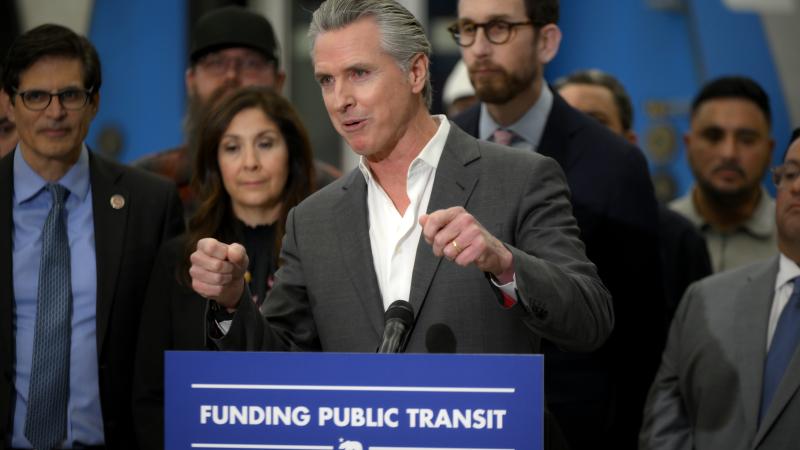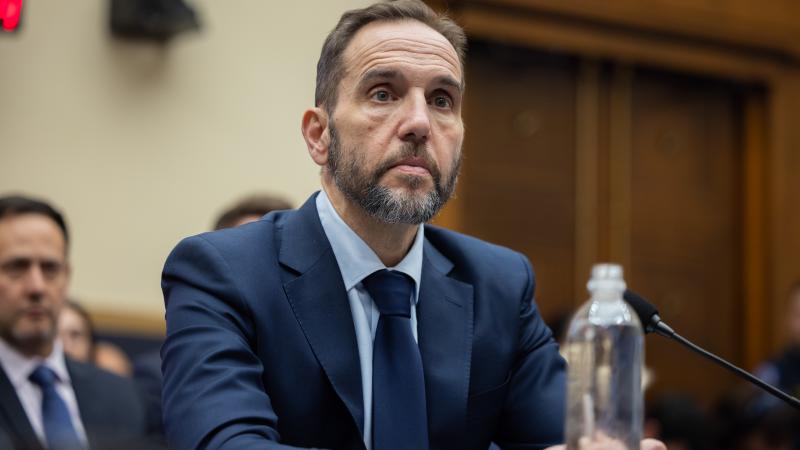US oil, gas hit record production despite opposition from OPEC, activists, Biden administration
“Energy poverty, for the first time in 20 years, increased. That's a travesty," said Toby Rice, president and CEO of EQT Corporation.
The United States is producing more oil now than any nation in the world has ever produced. In 2008, the U.S. produced only 5 million barrels of oil a day. Last year, the country produced 13 million barrels daily.
The United States' record-breaking production is often used to knock back the argument President Joe Biden’s energy policy aims to minimize domestic fuel fuel production – to cut carbon emission and make way for more renewable energy.
However, Toby Rice, president and CEO of EQT Corporation, a natural gas company, said recently at the “Energy Future Forum” in Washington, D.C., that looking at the production figures ignores the demand side of the equation.
“Energy poverty, for the first time in 20 years, increased," he said, using the term that refers to a household reducing its consumption of energy because it's so expensive, which results in health-related and other problems.
"That's a travesty," Rice also said. "So clearly, we're not doing enough. Clearly, we need to be doing a whole heck of a lot more."
Mark Mills, director of the National Center for Energy Analytics, put the production increase into a historical perspective.
He points out the only event that unleashed more energy upon the globe was the opening of the Ghawar Oil Field in Saudi Arabia between 1962 and 1972. The velocity with which American producers extracting energy from shale deposits in the U.S. increased energy production was 50% greater than that of the Saudi oil field.
“So we added more than a Saudi Arabia of hydrocarbons. In less than 10 years,” Mills said, referring to petroleum as “hydrocarbons.”
Chris Wright, CEO of Liberty Energy, a Denver-based oil and gas company, said it’s quite plausible, with the technologies and resources available, that the U.S. could increase energy production by the same amount in the coming decade.
The Biden administration as recently as April announced initiatives to try to cut back on fossil fuel energy in the U.S.
"The Biden-Harris Administration is announcing key actions to build on this momentum and deliver clean electricity to more homes and businesses, helping lower energy costs for American families," the White House said in announcing the initiative, which called for the "Cut[ting] Dangerous Pollution from the Power Sector."
To be sure, climate change activists have been successful in their efforts, in large part by leveraging the power and influence of celebrity and money.
"Climate change is threatening the present and future of humankind," says the group Berdrola, whose stated mission is to help in the global transition to so-called green or clean energy.
"To turn this catastrophic situation around, we need role models ready to lead the fight. From youth activists like Greta Thunberg to established actors like Leonardo DiCaprio, among others. Below, we take a look at some of the public figures most committed to sustainability," the group says.
The shale wildcard
The explosion of energy production in the U.S. is the result of shale technologies, said speakers at the forum. Shale is hard rock deep underground. It’s less permeable than cement, but shale producers in the U.S. figured out how, with hydraulic fracturing and horizontal drilling, to drill into the rocks, create fissures throughout them, and extract oil and gas.
In the summer of 2014, oil prices on the West Texas Intermediate, the American benchmark, were over $100 per barrel. By January 2015, they’d tumbled to about $45 per barrel.
Despite the market crashing, the Saudis, which are part of the OPEC cartel, increased production.
Mills speculated that they did this as a sort of experiment. Before this boom in shale production, the world oil market was largely controlled by OPEC production. American shale producers became a wildcard on the global market, Mills said, which undermined their ability to predict markets with any precision. Their increased oil production kept downward pressure on oil prices, but shale production would go on to double their output.
“OPEC fought shale, and shale won,” Wright also said.
Rice says the U.S. is not only producing record-high oil and gas from its shale resources. It’s doing it more efficiently than ever. Prior to the use of these technologies, he said, the U.S. was operating 2,000 rigs to produce less than half the amount of energy we produce today with just 600 rigs.
“That's gonna allow us to continue to find ways to produce our energy more cost effectively going forward,” he said.
Wright says the U.S. is the world’s largest importer of natural gas. At the time, the natural gas industry operated with about 1,000 to 1,200 rigs. Today, companies are producing more than twice as much natural gas with only 100 rigs.
“No subsidies. Less humans. Less rigs. Less land. That’s technology,” Wright said.
The boom in oil and gas production, which began around 2008, brought a flood of investments to the industry, Wright explained. But then prices fell as the market was flooded with hydrocarbons. The returns were poor, and shale got a bad reputation with investors. Then, the ESG movement gained steam and started to further deprive the industry of capital.
Despite attacks from anti-fossil fuel advocates and OPEC, the shale business continued to grow, Wright said, and what’s come out of it is a more fiscally responsible business.
“The industry is becoming more disciplined and less dynamic,” Wright said.
Impediments
There continue to be challenges. Since 2010, Rice said, natural gas demand has grown 50% while pipeline infrastructure increased only 25%. Gas storage infrastructure increased only 12%.
“What does that mean? That means you're going to continue, because of lack of pipeline infrastructure, to see parts of the United States where natural gas is wildly expensive. The fact that Boston is paying $30 for their natural gas in the winter, when I'm selling that same gas a couple hundred miles away in Pennsylvania for a price of $3 or $4 – that is self induced, and we can fix that,” Rice said.
Pipeline projects always draw opposition from climate activists, and large projects generate protests that receive international attention, such as the protests of the Dakota Access Pipeline and the Mountain Valley Pipeline.
Wright said that U.S. production growth will likely be slower this year than it was last. That’s driven in part by the lack of infrastructure.
“We can produce just massively more natural gas on short notice, but where are we going to put it?” Wright said.
Wright said that the public’s mind about energy changes not so much from argumentation from advocates like him, but when energy becomes unaffordable.
“When you start getting blackouts, when people can't afford to put gas in their car, then people become sober very quickly,” Wright said.
Rice said that public opinion is already shifting on the topic of fossil fuels – the burning of which alternative energy activists have long considered a major contributor to global warming.
“The public is uneducated about energy," he said. "And the more they learn, the more they see that natural gas and fossil fuels are good for the planet. It's good for this world. And we're seeing perception really start to change."
















